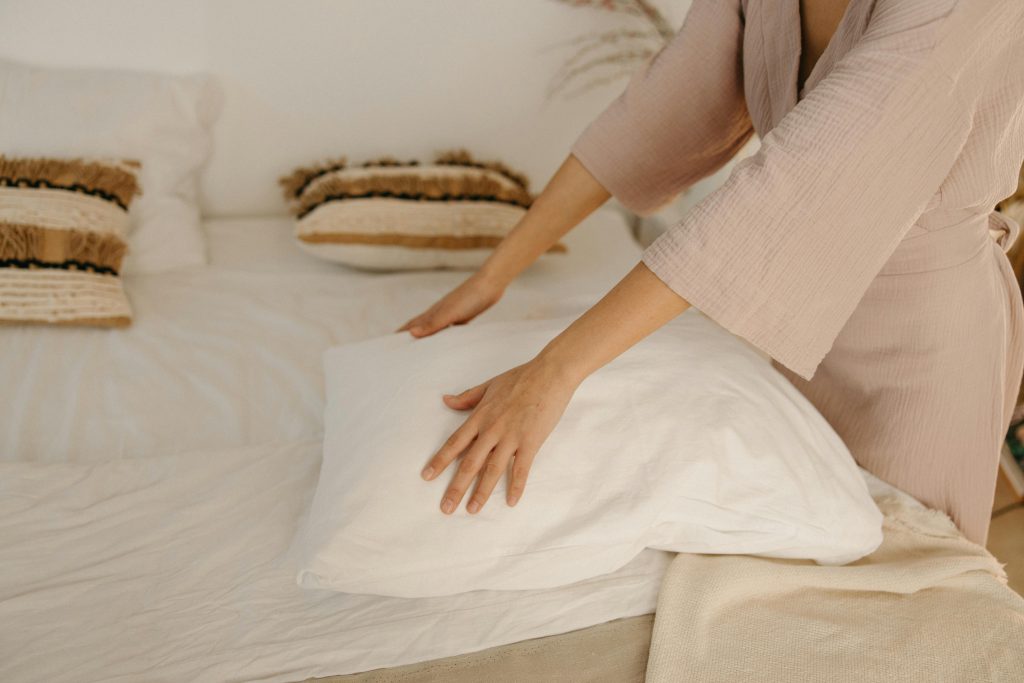Your cart is currently empty!
Simple Daily Habit Could Make You 206 Percent More Likely to Be a Millionaire

What if the secret to financial success wasn’t hidden in complex stock portfolios, grueling side hustles, or Silicon Valley-level innovation, but rather in something your mom told you to do every morning? A growing body of research suggests that making your bed a chore most people overlook as trivial could have surprising ties to productivity, self-discipline, and even long-term financial success. According to socio-economist Randall Bell, people who make their bed daily are statistically 206% more likely to become millionaires. The idea may sound almost absurd at first: how could such a small act be connected to the pursuit of wealth? But scratch beneath the surface, and the reasoning begins to make sense.
The millionaire-making bed isn’t about the sheets, pillows, or hospital corners. It’s about creating order, building structure, and setting a tone of intentionality from the very start of the day. Small habits have a compounding effect, Bell argues, and success is rarely built on a single grand gesture. Instead, it emerges from hundreds of tiny, repeated choices that form character, focus, and discipline. And it’s not just about financial success either; psychologists, entrepreneurs, and high achievers alike emphasize that routines such as this are keystone habits behaviors that trigger a ripple effect of positive actions throughout the day. So yes, tucking in your blanket in the morning may not make you rich on its own, but as part of a broader set of rich habits, it could set you firmly on the path toward it.
The Bed-Making Connection
Randall Bell’s research spans over 25 years, with surveys covering students and retirees to multi-millionaires. One of his most striking findings is the correlation between making the bed and financial success. Those who practiced this small act of tidiness were more than twice as likely to become millionaires compared to those who didn’t. To skeptics, this might sound like correlation dressed up as causation. After all, simply pulling a duvet up can’t deposit money in your bank account. But Bell’s findings point to something deeper: making your bed each morning instills discipline, reinforces control over one’s environment, and creates momentum for other productive habits.
Psychologists back this up. Jordan Peterson, the Canadian psychologist and professor, often encourages people to “start by cleaning your room” as a first step toward building a better life. It’s symbolic: creating order out of chaos in your personal space cultivates clarity of thought, reduces stress, and provides a sense of accomplishment before the day even begins.

For millionaires and high achievers, that mental clarity and confidence are invaluable. It’s a mental framing device that tells your brain: I am the kind of person who finishes what I start. Once that identity takes root, it influences how you approach bigger challenges, whether it’s business negotiations, investments, or personal growth.
Moreover, researchers point out that habits cluster. People who make their bed aren’t just neat freaks; they tend to adopt other positive rituals, like planning their day, keeping track of finances, and nurturing professional and personal relationships. The bed is just the beginning of a chain reaction, setting the stage for a lifestyle geared toward consistency and achievement. It’s less about the blanket and more about the brain behind the act.
Beyond the Sheets: Other Rich Habits

Bell’s study didn’t stop with bed-making. He and other researchers identified a set of recurring daily practices among millionaires that paint a bigger picture of how small actions stack into significant outcomes. Reading, for example, plays a massive role. Millionaires often devote at least 30 minutes a day to reading, whether it’s books, newspapers, or specialized industry journals. Bill Gates reads 50 books a year, and Warren Buffett famously spends up to 80% of his day reading. The logic is clear: feeding the brain is as important as feeding the body. Knowledge compounds like interest, shaping better decision-making and sparking ideas that can lead to financial opportunities.
Another consistent habit is waking up early. Thomas Corley, author of Change Your Habits, Change Your Life, studied 177 self-made millionaires and discovered that nearly half woke up at least three hours before their official workday began. By reframing discomfort, the goal becomes reclaiming time rather than seeking pain.

Early mornings are typically free of distractions, providing a golden window for exercise, strategizing, and personal development. Richard Branson, for instance, rises at 5 a.m. to squeeze in a workout, crediting his fitness routine with doubling his productivity. It’s about setting the tone of control before the chaos of the world seeps in.
Even etiquette and social habits came up as major predictors of success. Self-made millionaires, researchers found, put energy into remembering birthdays, sending thank-you notes, and cultivating good manners. On the surface, this may sound quaint, but in practice, it builds strong networks. Relationships are the invisible threads that often determine professional opportunities. Being seen as considerate, reliable, and respectful makes people more likely to collaborate with you, invest in your ideas, or recommend you for opportunities. As Corley summed it up: “If you’re a jerk, and you’re upsetting everybody, nobody’s going to want to work with you, and you’re never going to be a millionaire.”
Discipline, Consistency, and the Ripple Effect

The key lesson isn’t that every small act is extraordinary, but that when combined, those acts build momentum and multiply over time. Discipline in one area tends to spread into others, creating a mindset geared toward persistence and achievement. Making the bed might give you the sense of having completed something tangible, which then primes you to tackle the next task. Reading daily sharpens your mind, which improves your professional decision-making. Exercising keeps your body energized, giving you stamina to pursue long-term goals. Over time, these habits reinforce each other in a feedback loop.
Researchers like Bell describe this as a “frame of reference” shift. Once you view yourself as someone who finishes tasks, sticks to routines, and invests in growth, you’re less likely to waste time on unproductive behaviors like gossiping, which Bell found was one thing millionaires largely avoided. Each productive act ripples outward, influencing how you handle challenges, setbacks, and opportunities. The effect is subtle but powerful: rather than being swayed by chance, your daily structure sets you up to handle life’s unpredictability with clarity and persistence.
It’s also worth noting that these habits demand effort. Ari Rastegar, a real estate entrepreneur, emphasizes that there’s no quick five-step plan to wealth. Building strong habits requires daily work and intentionality. The rewards come slowly, often invisibly at first, but compound over time. This is why the bed-making statistic resonates; it’s the perfect metaphor for the larger truth. Small, repeatable actions done consistently transform into life-changing outcomes.
Wealth and Well-Being: The Human Side of Habits

While the headlines love to emphasize money, the impact of these habits goes far beyond financial gain. Bell’s research also correlated habits like family dinners and maintaining relationships with higher overall happiness. People who dined regularly with their families were 41% more likely to report happiness and 43% more likely to earn over $100,000 a year. This serves as a reminder that true success isn’t measured only by money but by how well you build a fulfilling and balanced life.
Making your bed, exercising, reading, and being courteous to others build not just wealth but resilience, contentment, and self-respect. They anchor you in routines that reduce stress and increase your sense of control over life. Charles Duhigg, in his book The Power of Habit, calls bed-making a keystone habit because of its wide-reaching influence on other areas of life. It’s not about the sheets; it’s about setting a tone of order and confidence. In an age where many people feel overwhelmed by chaos, such grounding habits become even more crucial.
Even critics who scoff at the millionaire statistic admit there’s no harm in developing such practices. At the very least, you’ll have a neat bed to crawl into at the end of the day and a mind that feels a little clearer. At most, you might just be putting yourself on the same path tread by some of the world’s most successful people.
Small Steps, Big Outcomes
So, does making your bed every morning guarantee you’ll become a millionaire? Of course not. Correlation is not destiny. If that were the case, we’d all be lounging in mansions simply for fluffing our pillows. But the research makes a compelling case that small, disciplined actions set off a chain reaction that shapes who we are, what we achieve, and how we respond to opportunities. Whether in finance or personal growth, success seldom results from one grand gesture. It’s built through small, consistent choices made day after day.
If you’re aiming for financial success or simply a more balanced, fulfilled life, the lesson is clear: start small, and start consistent. Pull up the sheets, tuck in the corners, and give yourself that first, simple win of the day. Let it ripple into other choices: reading, planning, exercising, reaching out to loved ones, and showing kindness to strangers. Each small action builds the scaffolding of the life you want to create. Whether or not it makes you 206% more likely to become a millionaire, it will almost certainly make you 100% more likely to live with intention.
